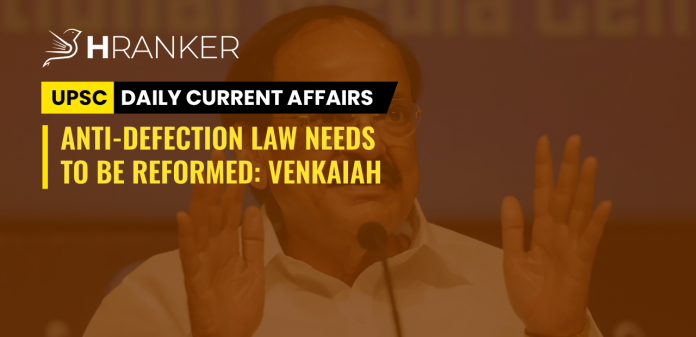WHAT’S IN NEWS?
The Vice-President says that the loopholes in Anti-defection law allow Wholesale Defection but do not allow Retail Defection and there is no clarity in the law about the time frame for the action of the House Chairperson or Speaker in Anti-Defection Cases. In Vice President’s opinion, the cases should be solved within three months and amendments are needed to make the law more effective.
KEYWORDS:
- JUDICIAL REVIEW: It is the power of the courts of a country to examine that the actions of the legislative, executive, and administrative arms of the government are consistent with the law of the land. Actions judged inconsistent are declared unconstitutional, null and void.
- REPRESENTATIVE DEMOCRACY: It is a form of democracy in which the people of the country choose their own representatives. The chosen representatives of the people frame laws of the country. The legislator is accountable to voters, and the government is accountable to legislators.
WHAT IS ANTI-DEFECTION LAW?
Anti-Defection law was added in the Constitution of India by the 52nd Amendment Act, 1985 to combat the “evil of political defections”. It is contained in the 10th Schedule of the Constitution of India. Its purpose was to bring stability to governments by discouraging legislators from changing parties.
It lays down the process by which legislators (MPs/MLAs) may be disqualified on grounds of defection by the Presiding Officer of a legislature.
The law applies to both Parliament and State Assemblies.
The anti-defection law punishes individual MPs/MLAs (Retail Defection) for leaving one party for another.
EXCEPTION: It allows a group of MPs/MLAs (Wholesale Defection) to join (i.e. merge with) another political party without inviting the penalty for defection. As per the 1985 Act, a ‘defection’ by 1/3rd of the elected members of a political party was considered a ‘merger’ but after the 91st Constitutional Amendment Act, 2003, at least 2/3rd of the members of a party has to be in favour for a ‘merger’ to be valid.
And it does not penalise political parties for encouraging or accepting defecting legislators.
TYPES OF DEFECTION:
- When legislators elected on the ticket of one political party ‘voluntarily give up’ membership of that party.
- When legislators vote in the legislature against the party’s wishes i.e. disobey the directives of the party leadership on a vote. This implies that a legislator defying (abstaining or voting against) the party whip on any issue can lose his membership of the House. A legislator’s speech and conduct inside and outside the legislature can lead to deciding the voluntarily giving up membership.
- When an MP/MLA who has been elected as an independent member, joins a party later.
- When a nominated legislator joins a political party after 6 months of being appointed to the House, if he joins within 6 months then it doesn’t amount to defection.
EXCEPTION: Speaker, chairman and deputy chairman of various legislative houses are exempted from disqualification on the ground of defection.
WHO IS THE DECISION MAKING AUTHORITY?
The Presiding Officers of the Legislature (Speaker, Chairman) are the deciding authorities and their decision shall be final and binding.
The law initially stated that the decision of the Presiding Officer is not subject to judicial review, but this condition was struck down by the Supreme Court in 1992, thereby allowing appeals against the Presiding Officer’s decision in the High Court and Supreme Court and making it subject to JUDICIAL REVIEW.
However, the Supreme Court in the Kihoto Hollohan vs Zachillhu And Others (1992) case held that there may not be any judicial intervention until the Presiding Officer gives his order.
The 10th Schedule bars the jurisdiction of any courts in the case of disqualification of a member. But this provision is not applied under Article 32, 137 and 226 of the Indian Constitution.
TIME FRAME TO DECIDE DEFECTION:
The law does not provide a time-frame within which the presiding officer has to decide a defection case. There are instances when the Speaker did not determine the case of a defecting MLA until the end of the legislature term. In some cases, defecting MLAs became ministers while a defection petition against them was pending before the Speaker.
NOTE: The members disqualified under the law can stand for elections from any political party for a seat in the same House.
ISSUES WITH ANTI-DEFECTION LAW:
The law could not meet the purpose for which it was framed since it could not ensure political stability.
The parties are misusing this law to their advantage by making the legislator resign and get re- elected and getting ministerial position as promised by the other party since as per the Constitution any person disqualified for defecting cannot get a ministerial position unless they are re-elected.
The Speaker who is usually from the ruling party delays taking a decision on the disqualification which leads to strange situations such as members who continue to be part of the main Opposition party becoming Ministers.
This law also restricts a legislator from voting in line with his conscience, judgement and interests of his electorate because an MP or MLA has absolutely no freedom to vote their judgement on any issue. They have to blindly follow the direction of the party.
This provision goes against the concept of representative democracy as it makes the MP/MLA neither a delegate of the constituency nor a national legislator but just an agent of the party.
The anti-defection bill weakens the accountability mechanism by making legislators accountable primarily to the party and not to the people who elected them to the post.
Defection also promotes horse-trading of legislators which clearly go against the mandate of a democratic setup.
SUGGESTIONS TO IMPROVE THE LAW:
Former Vice President Hamid Ansari has suggested that it should apply only to save governments in no-confidence motions.
The Election Commission has suggested that it should be the deciding authority in defection cases.
Others have argued that the President and Governors should hear defection petitions.
Supreme Court said Parliament should set up an independent tribunal headed by a retired judge of the higher judiciary to decide defection cases swiftly and impartially.
Political parties issue a direction to MPs on how to vote on most issues, irrespective of the nature of the issue. Several experts have suggested that the law should be valid only for those votes that determine the stability of the government.




